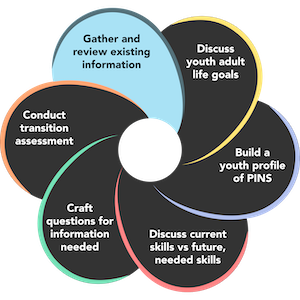Age-Appropriate Transition Assessment Planning Guide
Why plan with a Multi-Agency Team?
Schools and agencies have overlapping responsibility to serve and engage with transition youth. It saves time and extra meetings for everyone when agency professionals and schools come together to meet with the student and family to collaboratively fulfill their separate responsibilities. Many youth with disabilities may be eligible to receive services from one or more agencies while in school, so planning as a multi-agency team allows each agency to hear about transition assessment the others have collected and how to properly sequence their own supports to continue helping the youth towards their adult life goals. Agencies such as Opportunities for Ohioans with Disabilities (OOD) and County Boards of Developmental Disabilities (CBDD) can be consistent team members for youth across Ohio. Each community may have additional agencies, community organizations or non-profit entities that are important to include. A great way to introduce yourself to some of the consistent agency partners that can support transition-age youth is with Agency Navigation Tool on the Ohio Employment First website.
Youth and Family have opportunities to:
- Directly ask questions and gain clarity about proposed activities and services offered by a variety of entities
- Actively participate in all aspects of transition assessment
- Add, as an equal partner, their viewpoints to the transition assessment planning process
- Use the transition assessment data to make informed decisions and choices
- Get to know a contact person for each agency on the team
Agencies Can:
- Explain agency procedures and services
- Directly answer questions to clarify agency-specific procedures, services, timelines, etc.
- Make connections to the right person in their agency to initiate an impending action or procedure
- Add an 'adult life' perspective viewpoint
Educators Can:
- Provide background information about the youth
- Talk about interventions and strategies that have and have not been effective
- Answer questions about transition-related school experiences
- Describe the youth's learning styles
- Discuss any challenges the youth experiences in specific environments, sensory, motor or behavioral concerns
The Team Collectively:
- Coordinates transition assessment and transition planning activities before and beyond graduation from high school
- Has transition assessment information to begin agency-specific requirements for referral, intake and eligibility, when appropriate
- Experiences a reduction in the duplication of actions and activities across agencies by using the same transition assessment information and meetings to complete agency-specific requirements and procedures
- Improves and streamlines ongoing communication, building relationships across agencies

